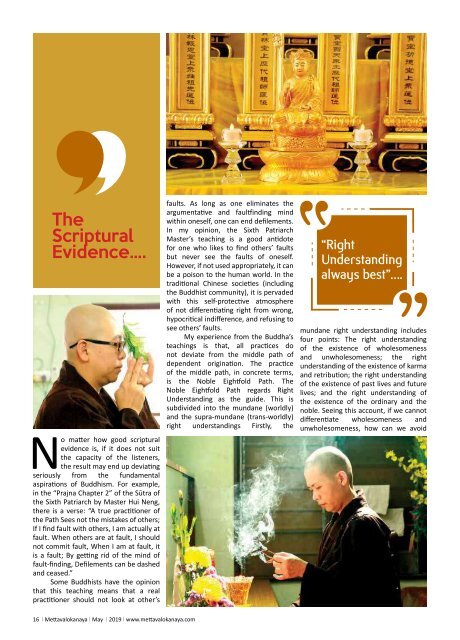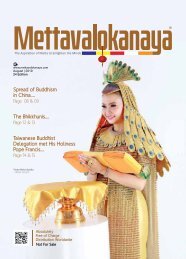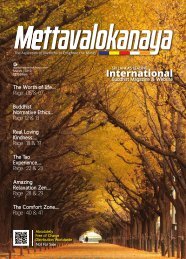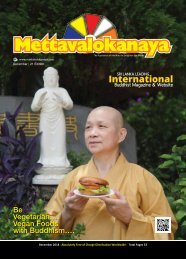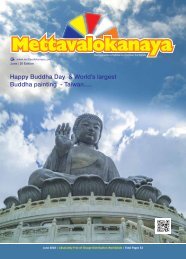Mettavalokanaya_International_Buddhist_Magazine_May_2019
“Mettavalokanaya” Sri Lanka’s leading & Most popular International Monthly Buddhist Magazine has been successfully distributed to 40 countries including all districts across Sri Lanka.
“Mettavalokanaya” Sri Lanka’s leading & Most popular International Monthly Buddhist Magazine has been successfully distributed to 40 countries including all districts across Sri Lanka.
Create successful ePaper yourself
Turn your PDF publications into a flip-book with our unique Google optimized e-Paper software.
The<br />
Scriptural<br />
Evidence….<br />
No matter how good scriptural<br />
evidence is, if it does not suit<br />
the capacity of the listeners,<br />
the result may end up deviating<br />
seriously from the fundamental<br />
aspirations of Buddhism. For example,<br />
in the “Prajna Chapter 2” of the Sūtra of<br />
the Sixth Patriarch by Master Hui Neng,<br />
there is a verse: “A true practitioner of<br />
the Path Sees not the mistakes of others;<br />
If I find fault with others, I am actually at<br />
fault. When others are at fault, I should<br />
not commit fault, When I am at fault, it<br />
is a fault; By getting rid of the mind of<br />
fault-finding, Defilements can be dashed<br />
and ceased.”<br />
Some <strong>Buddhist</strong>s have the opinion<br />
that this teaching means that a real<br />
practitioner should not look at other’s<br />
faults. As long as one eliminates the<br />
argumentative and faultfinding mind<br />
within oneself, one can end defilements.<br />
In my opinion, the Sixth Patriarch<br />
Master’s teaching is a good antidote<br />
for one who likes to find others’ faults<br />
but never see the faults of oneself.<br />
However, if not used appropriately, it can<br />
be a poison to the human world. In the<br />
traditional Chinese societies (including<br />
the <strong>Buddhist</strong> community), it is pervaded<br />
with this self-protective atmosphere<br />
of not differentiating right from wrong,<br />
hypocritical indifference, and refusing to<br />
see others’ faults.<br />
My experience from the Buddha’s<br />
teachings is that, all practices do<br />
not deviate from the middle path of<br />
dependent origination. The practice<br />
of the middle path, in concrete terms,<br />
is the Noble Eightfold Path. The<br />
Noble Eightfold Path regards Right<br />
Understanding as the guide. This is<br />
subdivided into the mundane (worldly)<br />
and the supra-mundane (trans-worldly)<br />
right understandings Firstly, the<br />
“Right<br />
Understanding<br />
always best”….<br />
mundane right understanding includes<br />
four points: The right understanding<br />
of the existence of wholesomeness<br />
and unwholesomeness; the right<br />
understanding of the existence of karma<br />
and retribution; the right understanding<br />
of the existence of past lives and future<br />
lives; and the right understanding of<br />
the existence of the ordinary and the<br />
noble. Seeing this account, if we cannot<br />
differentiate wholesomeness and<br />
unwholesomeness, how can we avoid<br />
committing unwholesome karma and<br />
reaping the suffering retribution? Since<br />
we can differentiate<br />
wholesomeness<br />
and<br />
unwholesomeness, then, how can we<br />
not see others’ wholesomeness and<br />
unwholesomeness? Second is the supramundane<br />
right understanding. They<br />
are: the Four Noble Truths and the law<br />
of dependent origination. That is, the<br />
right understanding of impermanence<br />
and selflessness. With these two right<br />
understandings as the guide, we can<br />
further develop the mundane and<br />
supramundane right thoughts. Firstly,<br />
when making the mundane right<br />
thought, one should contemplate as<br />
such: A’s bad deed is in fact evil. To<br />
feel unmoved towards evil does not<br />
mean that we have good cultivation;<br />
just that, perhaps, we are in fact<br />
apathetic. This may be due to a lack of<br />
right understanding in discriminating<br />
wholesome and unwholesome deeds.<br />
It may also arise from cowardice in our<br />
personal characters, and being afraid of<br />
confronting circumstances directly. No<br />
matter what, these two types of attitudes<br />
(lack of understanding in differentiating<br />
or the sentiment of being too afraid<br />
to confront issues), will not help us to<br />
develop pure practice qualities. This is<br />
because it is not in accordance with the<br />
principle of the Four Right Eliminations<br />
(Four Right Efforts) unable to make<br />
ourselves end the evil that has already<br />
arisen and prevent the evil that has not<br />
yet arisen from arising.<br />
Professor – Hsuan Chuang<br />
University and Fu Jen<br />
University, Head of the<br />
Department of Religious<br />
Studies President of Hong<br />
Shi <strong>Buddhist</strong> Foundation in<br />
Taiwan<br />
Most Venerable Bhikkhuni<br />
Chao Hwei Shih<br />
Taiwan<br />
Secondly, when performing the<br />
supramundane right thought, one<br />
should think as such: ‘A’s evil deed is real<br />
evil. I detest it a lot. Although I do not<br />
dare to say that I hate evil like an enemy,<br />
at least, as a person who is diligent in<br />
practicing the Four Right Endings and as<br />
a practitioner, I should also detest evil<br />
in the same way that I dislike sickness,<br />
tumors, and thorns; and urgently wish<br />
that the evil could be eliminated quickly.<br />
However, we should also remember that<br />
‘all actions are impermanent’. Do not<br />
fall into the trap of viewing the action<br />
as permanent or everlasting and always<br />
labeling ‘A’ as ‘evil’. This is because<br />
there is also a possibility that ‘A’ could<br />
correct his or her mistakes and practice<br />
wholesomeness. Thus, we should not<br />
have prejudice and enmity towards ‘A’<br />
after the incident and should not think<br />
that since he or she had once been<br />
evil, he or she will be evil for the whole<br />
life. We should have to try to create<br />
opportunities for ‘A’ to change himself<br />
or herself for better and practice good<br />
acts. The approach could be vigorous or<br />
tough, but the intention must be kind<br />
and compassionate. This is why although<br />
the bodhisattvas may be very kind and<br />
gentle to sentient beings, at certain<br />
times, they may also display fierceness<br />
and stern faces to subdue the evil mind<br />
and habits of sentient beings.<br />
In addition, we should also<br />
remember that all phenomena are<br />
selfless. Do not fall into the trap of selfcentered<br />
views. This is because when<br />
one falls into false self-view, when<br />
confronting ‘A’, what one is concerned<br />
with will no more be, ‘how can I help<br />
‘A’ to abstain from evil and do good?<br />
Or, how can I prevent ‘A’ from harming<br />
others?’ One will be thinking, ‘would ‘A’s<br />
evil affect me? How should I treat ‘A’ so<br />
that I can avoid his evil deeds or even<br />
gain benefits from him?’ We prefer to<br />
clean the snow in front of our own house.<br />
Why should we worry about the frost on<br />
others’ roofs? With such attitudes, one<br />
will naturally feel unmoved when seeing<br />
others doing evil. However, if the matter<br />
concerns us or affects our benefit, we<br />
may try to please the person, become<br />
an accomplice, act in collusion or use his<br />
evil to do even more severe evil deeds.<br />
In summary, these are thoughts that<br />
develop from the self, in the hope that<br />
we can avoid evil from A, or gain benefits<br />
out of it.<br />
Thus, the important point in<br />
practicing the Buddha’s path is not merely<br />
“to see not the faults of the world” but<br />
to eliminate our view of permanence<br />
and false self-view. From the stand point<br />
of impermanence and non-inherent<br />
self, for the sake of distinguishing right<br />
and wrong and to have compassion for<br />
sentient beings, being able to see the<br />
mistakes of the world is still of great<br />
significance. The Sixth Patriarch said,<br />
“When others are at fault, I should<br />
not commit fault, we should share the<br />
feelings of others like our own and be<br />
compassionate.” This exalted, pure, kind<br />
and compassionate virtue is founded<br />
on the ability of distinguishing right and<br />
wrong. Otherwise, without knowing<br />
what others are doing, whether it is right<br />
or wrong, how can we ensure that we<br />
are not at fault? And, how can we get rid<br />
of our habit of faultfinding and eliminate<br />
our defilements?<br />
Thus, it would be good if we can<br />
change one word in the Sixth Patriarch’s<br />
verse of “a true practitioner of the Path<br />
sees not the faults of the others” to “a true<br />
practitioner of the Path does not censure<br />
the faults of the others”. Do not censure<br />
means not to be too particular on the<br />
faults that others have done to us. We<br />
should not have the mind to revenge. We<br />
should be broadminded like the Chinese<br />
saying that one may sail in the stomach<br />
of the prime minister. This aspiration<br />
can be developed with the Mahāyāna’s<br />
sentiment where the bodhisattvas do<br />
not abandon the suffering of sentient<br />
beings. To prevent the other party from<br />
reaping the retribution of suffering, and<br />
to prevent the other party from harming<br />
other sentient beings, we certainly<br />
should think of ways to stop evil acts.<br />
The above ideas are in fact not<br />
suitable to be put across by using<br />
scriptural evidence only. One needs to<br />
use logical evidence to carefully examine<br />
the sūtras (the Chinese also regard The<br />
Sixth Patriarch’s Sūtra as a sūtra) so as<br />
to avoid the incompatibility between<br />
teaching and acceptance capacity, which<br />
may lead to another case of wrong<br />
interpretation of the sūtras.<br />
16 l <strong>Mettavalokanaya</strong> l <strong>May</strong> l <strong>2019</strong> l www.mettavalokanaya.com www.mettavalokanaya.com l <strong>2019</strong> l <strong>May</strong> l <strong>Mettavalokanaya</strong> l 17


